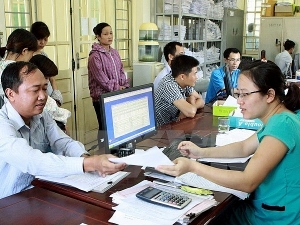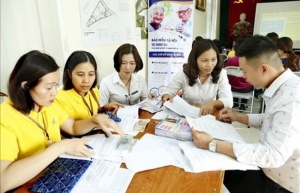Voluntary pensions to rejuvenate the sector
The Ministry of Finance (MoF) earlier this month announced the licensing of four fund management companies to offer voluntary supplementary pension fund services, marking a significant milestone in the nation’s financial services sector.
 |
| Voluntary pensions to rejuvenate the sector, illustration photo/ Source: freepik.com |
The firms granted licences are Dragon Capital Vietnam, MB Investment Fund Management, SSI Asset Management (SSIAM), and Vietcombank Fund Management, collectively operating 10 active funds.
This development is part of a broader initiative to receive applications for the establishment of such funds, with participation primarily from employees and officers within the fund system, totalling over 5,000 individuals.
According to the MoF, to qualify for a licence to provide pension fund management services, stringent criteria must be met, encompassing experience in life insurance and fund management.
Fund management companies must have at least five years of experience, manage assets totalling a minimum of VND1 trillion ($41.7 million), and currently operate open or bond funds, without undergoing restructuring.
“Additionally, these companies are required to employ a minimum of five personnel with at least five years of direct experience in pension fund management or investment fund management, including at least three staff members certified in fund management or holding a CFA designation,” the MoF said.
The introduction of voluntary supplementary pension funds represents a crucial evolution in the fund management industry, following closed funds, open funds, and exchange-traded funds. These pension funds are envisioned as an effective long-term strategic solution for the social security system, promoting capital market development through the increased participation of institutional investors.
Pioneering entities in this space are considered to be trusted with significant responsibility, given their market-leading reputation and service quality.
Dragon Capital, as the first fund management company to launch a voluntary supplementary retirement programme, has set a precedent for the direction of voluntary supplementary pension funds.
The company boasts hundreds of financial experts from various countries, managing an asset portfolio valued between $6 to $7 billion, including diverse funds ranging from equity to bonds, with some indirectly listed on stock markets in South Korea and Thailand.
In late December, SSIAM also introduced its voluntary pension fund, tailored to meet the long-term retirement needs of the workforce, yet it faces challenges due to modest public awareness and limited tax incentives for contributions.
“The preparation for a large-scale pension fund involves not only meticulous internal system enhancements but also extensive legal preparations, particularly because of the relatively unenticing tax deductions currently available,” an SSIAM representative explained.
Regulatory requirements dictate that voluntary pension funds invest a minimum of 50 per cent of their assets in government bonds, with the balance distributed among other fund certificates (primarily bond funds and bank deposits) and a smaller proportion in equities.
This conservative investment strategy ensures high security, necessitating substantial initial fund sizes to attract significant participation from both corporations and individuals.
MBCapital has also made significant strides in this area, obtaining a licence from the MoF in 2021 to manage a voluntary pension fund after three years of rigorous preparation.
By collaborating with MB, MBCapital has not only enrolled a large number of the bank’s employees but also leveraged the bank’s customer base of over 10 million, thus providing a robust platform for the fund’s expansion.
Ngo Thanh Huan, CEO of consulting and asset management firm FIDT, noted that pension funds are a dominant force in asset management, especially in nations with ageing populations such as Japan and South Korea.
“Internationally, voluntary pension funds benefit from substantial personal income tax incentives that encourage individuals to invest in their long-term financial security and retirement. Vietnam’s current tax incentives, which include a monthly tax-deductible contribution of VND1 million (approximately $41.7), are not compelling enough to attract the middle class or intellectuals and remain a novel concept to blue-collar workers,” Huan said.
To enhance the appeal of the pension fund market, industry voices are advocating for better tax benefits and adjustments to asset allocation rules. The predominant investment in government bonds limits potential yields, making these funds less competitive compared to others with a higher equity allocation.
Vietnam’s approach to fund management, especially in the context of long-term investments like pension funds, necessitates a robust risk management framework to safeguard participant interests in the event of corporate or fund insolvency, according to Minister of Finance Ho Duc Phoc during a discussion earlier this month.
“It is imperative that we manage risks from an early stage and from a distance, especially considering the long-term nature of this market, which can extend up to 99 years,” Minister Phoc said.
“There is a significant risk that enterprises and funds might not preserve their value, leading to losses or bankruptcy, which would adversely affect the rights of the insurance participants. Therefore, the MoF is exceedingly cautious with this type of investment,” he said.
 | Voluntary social insurance attracts more participants As many as 606,000 people had joined voluntary social insurance as of May 31 this year, completing half of the set target and up 26,000 compared with the figure of 2019, heard a meeting in Hanoi on June 9. |
 | Voluntary social insurance participants up 305 folds in 16 years: VSS The number of voluntary social insurance participants has risen 305 folds to 1.83 million since the policy was put in place in 2008, according to the Vietnam Social Security (VSS). |
What the stars mean:
★ Poor ★ ★ Promising ★★★ Good ★★★★ Very good ★★★★★ Exceptional
Related Contents
Latest News
More News
- Cashless payments hit 28 times GDP in 2025 (February 04, 2026 | 18:09)
- SSIAM and DBJ launch Japan Vietnam Capital Fund (February 04, 2026 | 15:57)
- Banks target stronger profits, credit growth in 2026 (February 04, 2026 | 15:43)
- Vietnam on path to investment-grade rating (February 03, 2026 | 13:07)
- Consumer finance sector posts sharp profit growth (February 03, 2026 | 13:05)
- Insurance market building the next chapter of protection (February 02, 2026 | 11:16)
- NAB Innovation Centre underscores Vietnam’s appeal for tech investment (January 30, 2026 | 11:16)
- Vietnam strengthens public debt management with World Bank and IMF (January 30, 2026 | 11:00)
- Corporate bond market poised for stronger growth cycle (January 28, 2026 | 17:13)
- Vietnam's IPO market on recovery trajectory (January 28, 2026 | 17:04)

 Tag:
Tag:


















 Mobile Version
Mobile Version